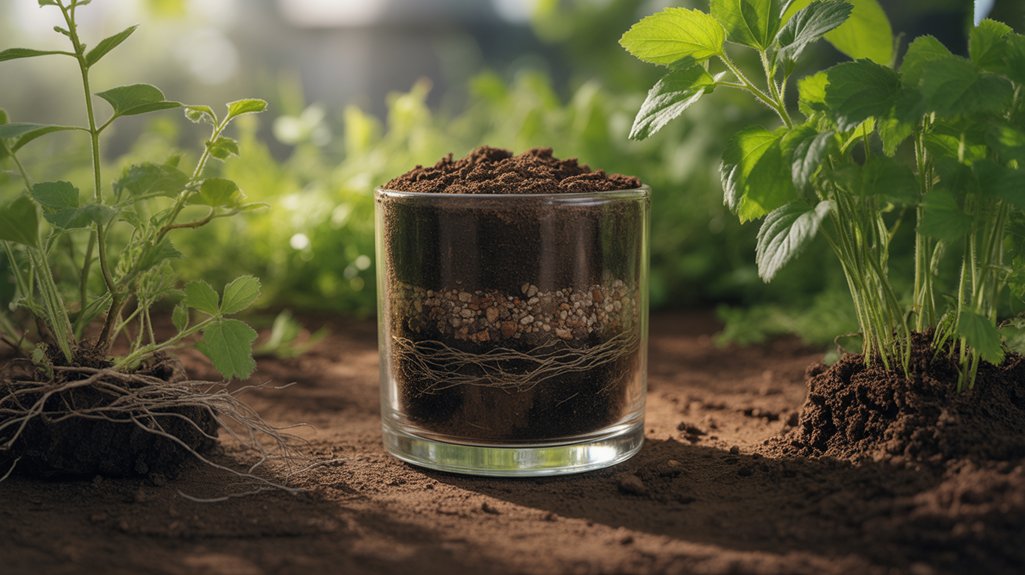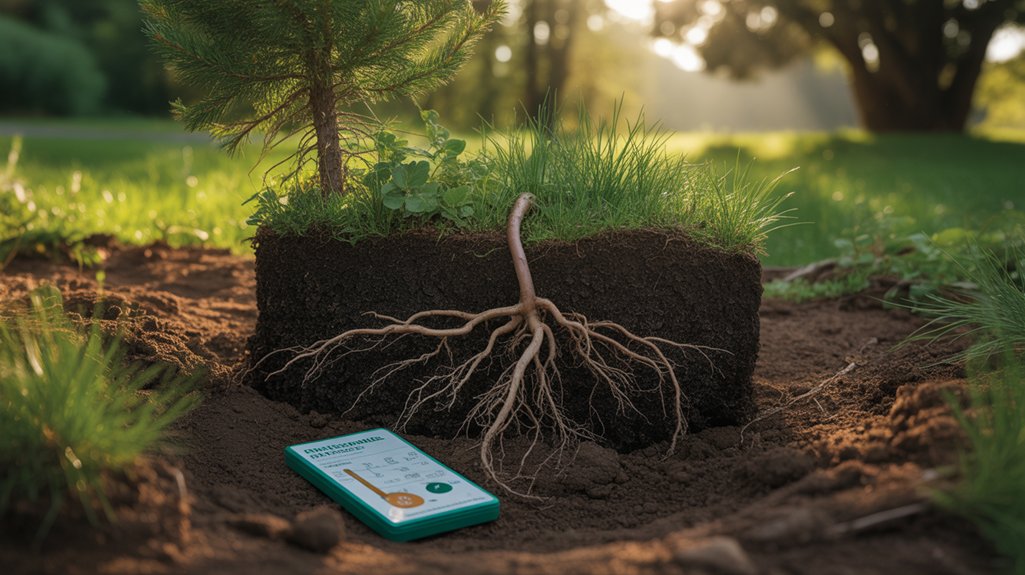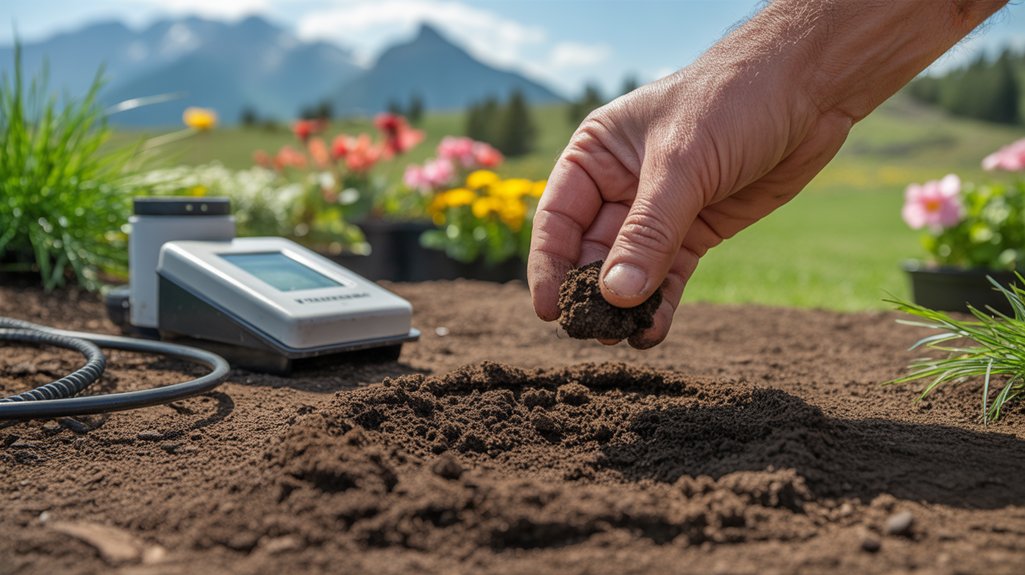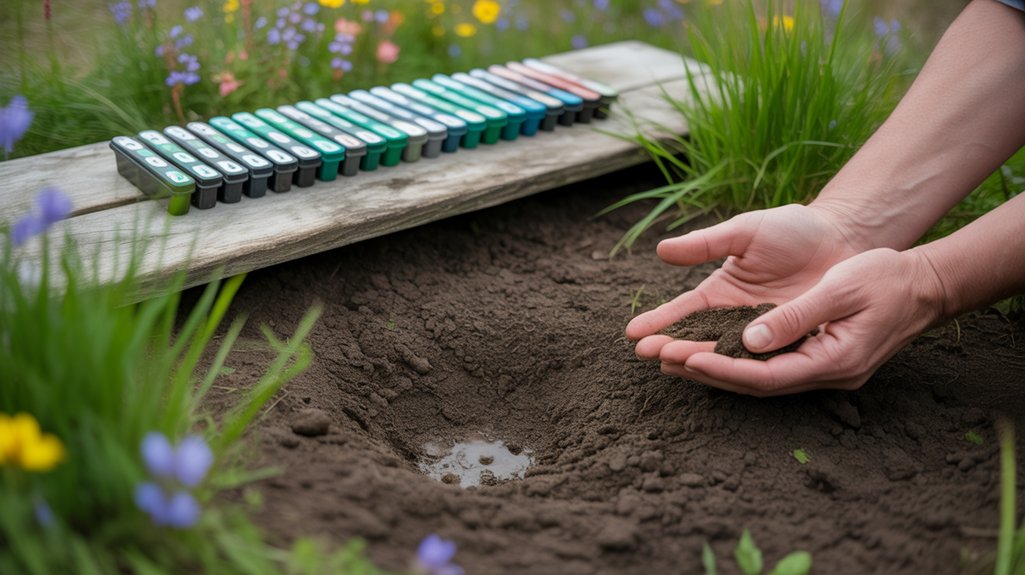The Importance of Soil Testing for Healthy Landscapes in Castle Pines and Northglenn
Soil testing is a key step in achieving a thriving landscape in Castle Pines and Northglenn. By understanding your soil’s composition and nutrient levels through soil testing in Castle Pines and Northglenn, you can make informed decisions that promote plant health and beauty. Ignoring this process can lead to poor growth and wasted resources. What specific benefits can tailored soil management bring to your garden? Exploring this further can reveal essential insights for your landscape’s success.
Understanding Soil Composition and Its Impact on Plants

Have you ever wondered why some plants thrive while others struggle to survive in the same soil? Understanding soil composition through soil testing in Castle Pines and Northglenn is crucial to unraveling this mystery.
Soil texture plays a significant role in how well plants grow. Sandy soils drain quickly but can lack nutrients, while clay soils retain moisture but may become compacted. Both extremes can hinder plant development.
Additionally, soil microorganisms are vital for healthy plant life. These tiny organisms break down organic matter, releasing nutrients that plants need. Without a balanced mix of soil texture and active microorganisms, your plants might not get the support they require.
The Role of Ph Levels in Soil Health

pH levels play a crucial role in determining soil health, as they influence nutrient availability and microbial activity. Understanding these levels through soil testing in Castle Pines and Northglenn can help you optimize your landscape.
Here are three key points to consider:
- Nutrient Availability: The right pH ensures that essential nutrients are accessible to your plants, while extreme acidity can lock them away.
- Microbial Activity: Healthy soil microorganisms thrive in balanced pH conditions, helping decompose organic matter and promote plant growth.
- pH Measurement Techniques: Regularly testing your soil using pH measurement techniques allows you to monitor and adjust acidity levels effectively.
Identifying Nutrient Deficiencies Through Soil Testing

How can you tell if your plants are struggling due to nutrient deficiencies? You might notice yellowing leaves, stunted growth, or poor flowering.
These signs indicate that your soil may lack essential nutrients. Conducting a nutrient analysis through soil testing in Castle Pines and Northglenn is the best way to identify these deficiencies accurately.
By sampling your soil, you’ll receive detailed information on nutrient levels and pH balance. Once you know what your soil needs, you can apply the right soil amendments to restore its health.
This targeted approach ensures your plants get the nutrients they require for vibrant growth. By being proactive with soil testing in Castle Pines and Northglenn, you’ll create a thriving landscape.
How Soil Testing Influences Fertilization Practices
Understanding your soil’s nutrient profile doesn’t just help identify deficiencies; it also shapes your fertilization strategies. When you know what your soil needs through soil testing in Castle Pines and Northglenn, you can optimize your fertilizer application and improve plant health.
Here’s how soil testing influences your approach:
- Targeted Nutrients: Soil tests reveal specific nutrient needs, so you apply the right fertilizers rather than guessing.
- Efficient Timing: With insights from testing, you can plan nutrient timing to match plant growth stages, maximizing uptake.
- Cost-Effectiveness: By avoiding excess fertilizer, you save money and minimize environmental impact.
For more information on effective fertilization, check this Gardener’s Supply guide.
Choosing the Right Plants for Your Soil Type
When selecting plants for your landscape, it’s crucial to consider your soil type, as this foundational element directly affects plant health and growth.
Begin by conducting soil testing in Castle Pines and Northglenn to understand its pH, texture, and nutrient levels. This information will guide your plant selection, ensuring you choose species that thrive in your specific conditions.
For instance, sandy soils drain quickly and may require drought-tolerant plants, while clay soils retain moisture and can support more water-loving varieties.
Always prioritize soil compatibility when selecting plants to promote robust growth and reduce maintenance.
The Connection Between Soil Health and Water Management
Soil health plays a crucial role in effective water management, as healthy soil can absorb and retain moisture more efficiently. By focusing on soil quality through soil testing in Castle Pines and Northglenn, you can enhance your irrigation strategies and reduce water waste.
Here are three key benefits of healthy soil for water management:
- Increased Water Retention: Healthy soil holds more moisture, reducing the frequency of irrigation needed.
- Improved Drainage: Well-structured soil allows excess water to drain away, preventing waterlogging and root rot.
- Enhanced Nutrient Availability: Healthy soil supports beneficial microorganisms that help break down organic matter, making nutrients more accessible to plants.
The Environmental Benefits of Healthy Soil
Healthy soil not only enhances water management but also offers a range of environmental benefits that contribute to ecosystem stability. When you prioritize soil conservation through soil testing in Castle Pines and Northglenn, you’re investing in the health of your local environment.
Healthy soil supports diverse plant life, which in turn provides habitats for various animals and insects. The presence of organic matter enhances soil structure, allowing for better aeration and water retention. This means less runoff and more nutrients available for plants.
Additionally, healthy soil can sequester carbon, reducing greenhouse gases in the atmosphere. By fostering a robust soil ecosystem, you promote biodiversity and resilience against climate change, ensuring a thriving landscape for both you and future generations.
Common Soil Issues in Castle Pines and Northglenn
While enjoying the natural beauty of Castle Pines and Northglenn, you might not realize that common soil issues can impact your landscape’s health.
Here are three problems you should be aware of:
- Soil Erosion: This can wash away valuable organic matter, leaving your plants nutrient-deficient.
- Compaction Issues: Over time, soil can become compacted, reducing its ability to drain properly and hindering root growth.
- Nutrient Runoff: Excess nutrients can wash away during rain, leading to drainage problems and harming local water sources.
Addressing these through soil testing in Castle Pines and Northglenn can prevent long-term damage.
Steps to Conducting a Soil Test
Conducting soil testing in Castle Pines and Northglenn is a straightforward process that can significantly enhance your landscape’s vitality.
Start by gathering your tools: a clean container, a garden trowel, and a soil testing kit. For effective soil sampling, choose multiple locations in your yard, digging down about 6 inches to collect samples.
Mix these samples in your container to get a representative blend of your soil. Next, follow the instructions in your testing kit, which may involve sending your sample to a lab or using at-home testing techniques.
Be sure to label your samples and document where they were taken. After you’ve sent off or tested your soil, you’ll be one step closer to understanding how to improve your landscape’s health.
Interpreting Soil Test Results for Optimal Landscape Management
Once you’ve received your soil test results, it’s time to decode what they mean for your landscape. Understanding these results is crucial for effective nutrient management in Castle Pines and Northglenn.
Here’s how to interpret them:
- Nutrient Levels: Check the levels of essential nutrients like nitrogen, phosphorus, and potassium. These will guide your soil amendments.
- pH Balance: A proper pH level ensures nutrient availability. If it’s too high or low, consider adjusting it with lime or sulfur.
- Organic Matter: High organic matter improves soil structure and health. If it’s low, add compost or organic fertilizers.
Frequently Asked Questions
How Often Should I Test My Soil?
You should test your soil every 2 to 3 years to monitor soil nutrients effectively. This test frequency helps you understand nutrient levels, ensuring your plants thrive and your landscape remains healthy and vibrant.
Can I Test My Soil at Home?
Yes, you can test your soil at home using DIY soil testing methods. Home testing kits make it easy to analyze pH levels and nutrient content, helping you understand your soil’s needs without professional assistance.
What Time of Year Is Best for Soil Testing?
The best time for soil testing in Castle Pines and Northglenn is in spring or fall. Spring testing helps you prepare for planting, while fall testing allows you to amend the soil before winter. Choose the season that fits your garden plans.
Are There Specific Tests for Different Plants?
Yes, there are specific tests tailored to different plants. You’ll want to consider their unique nutrient requirements and specific crop needs. This ensures your soil supports healthy growth and maximizes your garden’s potential.
How Long Does It Take to Get Soil Test Results?
Soil testing results typically take a week or two, depending on the lab’s turnaround time. You’ll want to check with your chosen lab for their specific timeframe to plan accordingly for your gardening needs.
In conclusion, soil testing in Castle Pines and Northglenn is essential for creating and maintaining vibrant landscapes. By understanding your soil’s composition and nutrient levels, you can make informed decisions about fertilization and plant selection. This not only enhances the health and beauty of your garden but also promotes environmental sustainability. For professional assistance, contact Above & Beyond Services to optimize your landscape with expert soil testing in Castle Pines and Northglenn. So, take the time to conduct soil tests and nurture your soil—your plants will thrive, and your landscape will flourish!
Key Takeaways
- Soil testing in Castle Pines and Northglenn identifies nutrient deficiencies and pH imbalances, ensuring optimal conditions for plant growth.
- Understanding soil composition through testing helps tailor fertilization practices, enhancing plant health while minimizing environmental impact.
- Regular soil analysis promotes proactive management, allowing residents to address issues before they affect landscape vitality.
- Healthy soil improves water retention and reduces runoff, contributing to sustainable landscapes in the region.
- Soil testing fosters biodiversity by supporting diverse plant life, which in turn provides habitats for local wildlife.




